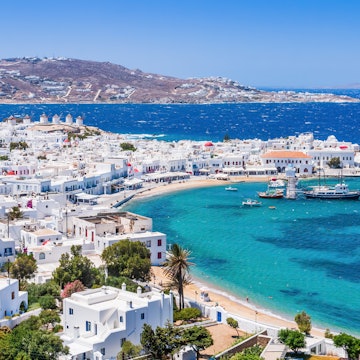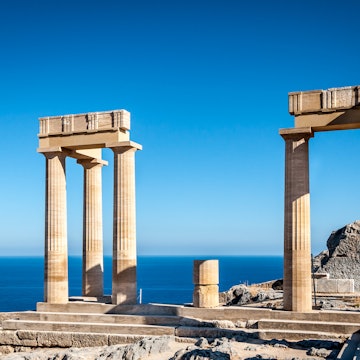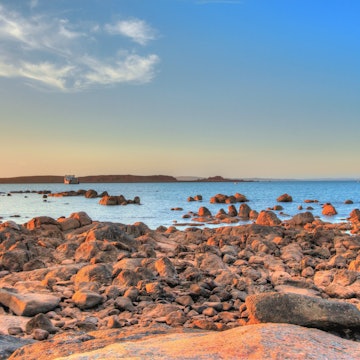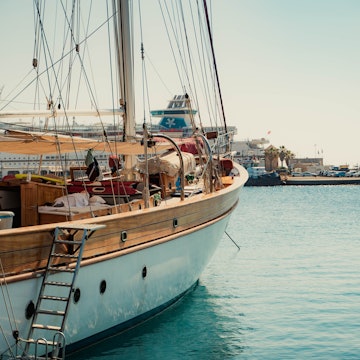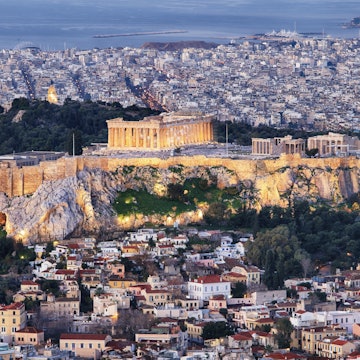

The town of Ierapetra, Crete. Adrian Popov/Shutterstock
It would take weeks – maybe months – to experience everything Crete has to offer, Greece's largest and most southerly island. With mountains, unspoilt beaches, two cities (Hania and Heraklion) and year-round sunshine, you could pack a lot in.
To get you going, here are some of our favorite things to do on this incredible Greek island. From idling on the beaches to hiking in the stark, dramatic mountains and gorges, from eating delicious local food to partying all night long, there's something for every mood.
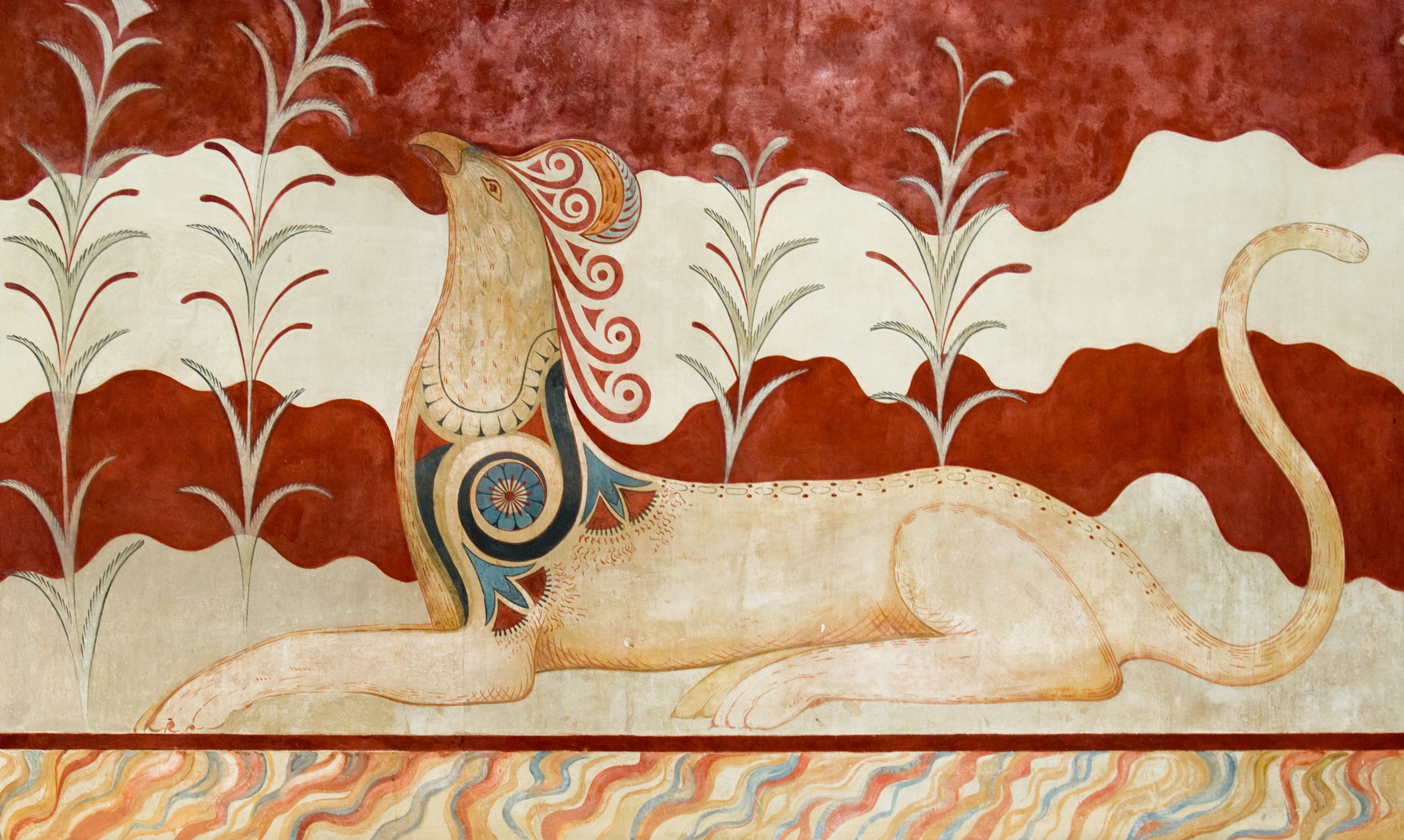
1. Visit the famous historical Palace of Knossos
At the Palace of Knossos, you can feel the playful passion of the artists who painted its many frescoes 4000 years ago, such as the one in the queen's megaron (bedroom) showing dolphins frolicking. Check out the charging bulls on the famous work near the North Entrance. Or ponder the plumbers and engineers who designed the water system – it may work better than yours does at home. Finally, appreciate the architects who cleverly placed rooms and windows to catch seasonal changes in the light.
Planning tip: Try to arrive as early in the morning (by 8am) as possible, or late in the afternoon, to avoid intense heat and crowds, and dump the flip-flops for sturdy shoes as there are steps and much of the ground is uneven.
2. Marvel at the marble at lerapetra Archaeological Museum
Located in a 19th-century school built by the Ottomans, the Archaeological Museum in lerapetra may initially seem like just another dusty repository for carved rocks and clay shards. That is until you see the grandeur of an intact statue (no missing parts, take that Venus de Milo!) of the goddess Persephone that dates back to the 2nd century CE. And that's just the start of the surprises at this compact gem. Don't miss the big larnax (clay coffin) from 1300 BCE, which is decorated with hunting scenes, a chariot race and, yes, an octopus.
Detour: Head to Koutsounari beach nearby and enjoy a swim in the Libyan Sea. The only town on Crete's southern and less touristy coast, lerapetra is locally nicknamed "the bride of the Libyan Sea".

3. Beach-hop the southwest coast by boat
Yes, you can drive to many of the fine beaches along the southwest coast – Crete's best bunch of beaches – but why fight curves, traffic and even nausea on the treacherous mountain roads when you can hop from one magnificent beach to the next by ferry? From May to September, local fishers run small boats that stop at beaches, including unmissable ones at Hora Sfakion, Agia Roumeli, Paleohora and Elafonisi. Relax and enjoy the sublime views of the sheer cliffs plunging into the water.
4. Hike in the stunning Samaria Gorge
Sheer rock faces only 3m (9ft) apart are one of the many splendid sights on the 18km (11-mile) hike down to the sea through one of Greece's most popular natural attractions, Samaria Gorge. If you're really lucky, you'll spot a kri-kri, the ever-more-rare goat species native to Crete. But if nothing else, you'll be doing your own goat act as you navigate the trail past geologic wonders, abandoned churches and vast carpets of wildflowers.
Planning tip: Check the weather in advance. The gorge may close due to a heat wave or extreme rain.
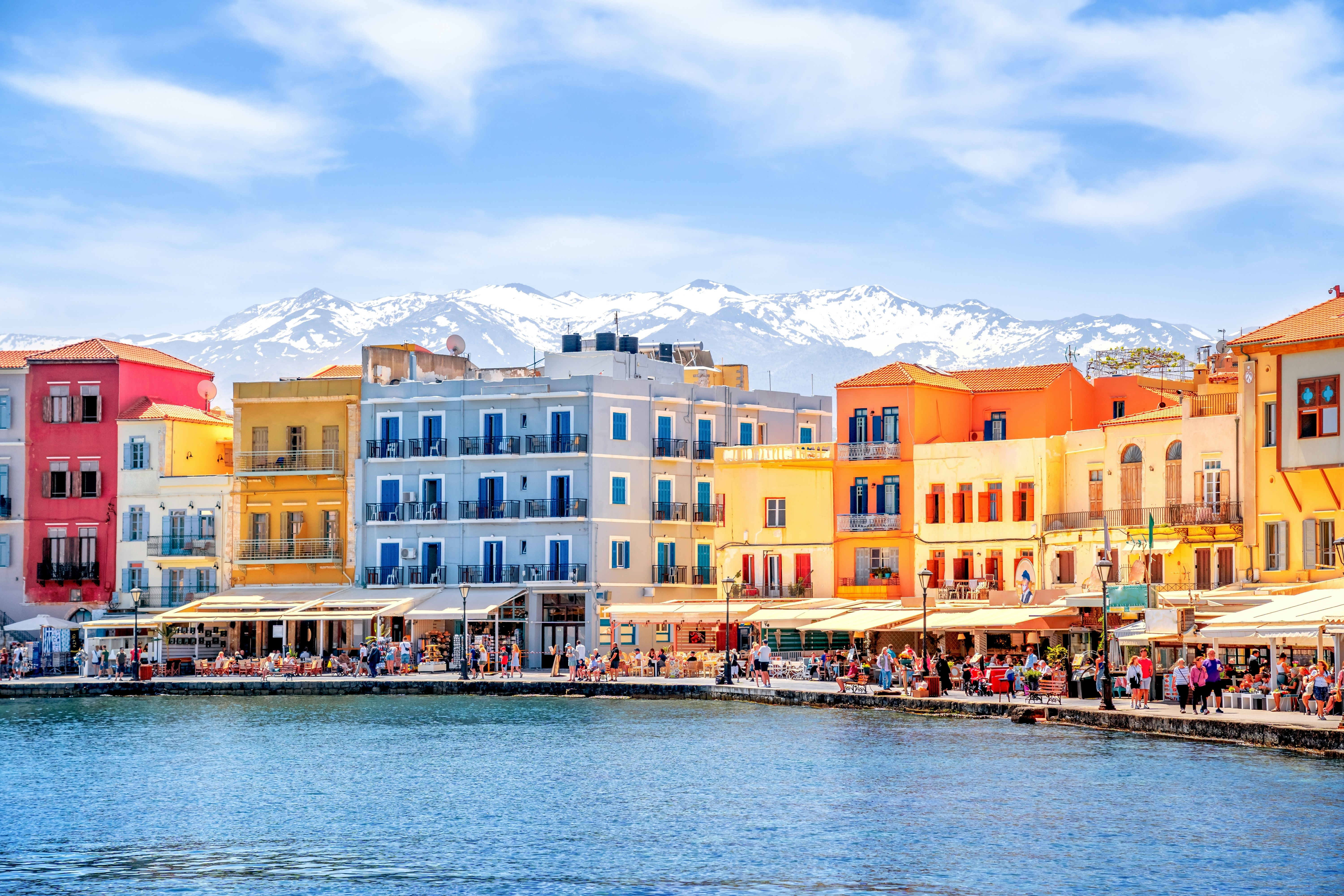
5. Eat your way through the best food in Hania
Hania has some of the best chefs cooking some of the best food using some of the best ingredients in Greece. This is the city Cretans mention when asked “where do you like to eat?” Note that quality is directly related to the distance from the water, the further you go down the old stone lanes away from the ho-hum tourist tavernas on the port, the better it gets. Look for cafes and bistros with changing chalkboards and menus that reflect what's freshest at the moment.
6. Party the night away in Iraklio
Crete's capital heaves with students who make its nightlife scene manic and never-ending. Cafes cater to the hungover by day, and bars get lively in the evening. Clubs get going after 1am and keep partying well past dawn. Iraklio is a firm fixture on the top DJ circuit. Look for action in the Koraï Quarter, around El Greco Park and at the west end of the harbor, among other places. The edgy vibe is just the antidote to the cocktails with silly names and watery seltzers at the resort clubs.
There can be a dress code at some clubs and bars so try not to arrive in a t-shirt and sliders and when ordering drinks or snacks in a bar, rounding up the bill is common practice in Crete.

7. Follow trails at the former quarantine island of Spinalonga
For much of the 20th century, Greeks with leprosy (Hansen's disease) were sent to live in quarantine on Spinalonga Island, just off Crete's east coast. For decades, conditions were appalling. Only beginning in the late 1930s and lasting until the colony closed in 1957 were people treated with some dignity.
Planning tip: Spinalonga is the setting of Victoria Hislop's best-selling novel The Island – read it before you go. While on the island, stop by the Venetian fortress.
8. Wander the maze of streets in Rethymno
Gaze out to sea from Rethymno's Fortezza, the vast fortress built to protect the port from marauding pirates in the 16th century. The old town's tangle of streets off the Venetian Harbour is a maze of delights. Although small enough not to get too lost, you will still get swallowed up by the past – and then you can stop for a modern drink at a flower-shaded cafe.Narrow streets and limited parking spaces at high season can make driving challenging, but not impossible. If you can travel in by foot or public transport, do so.
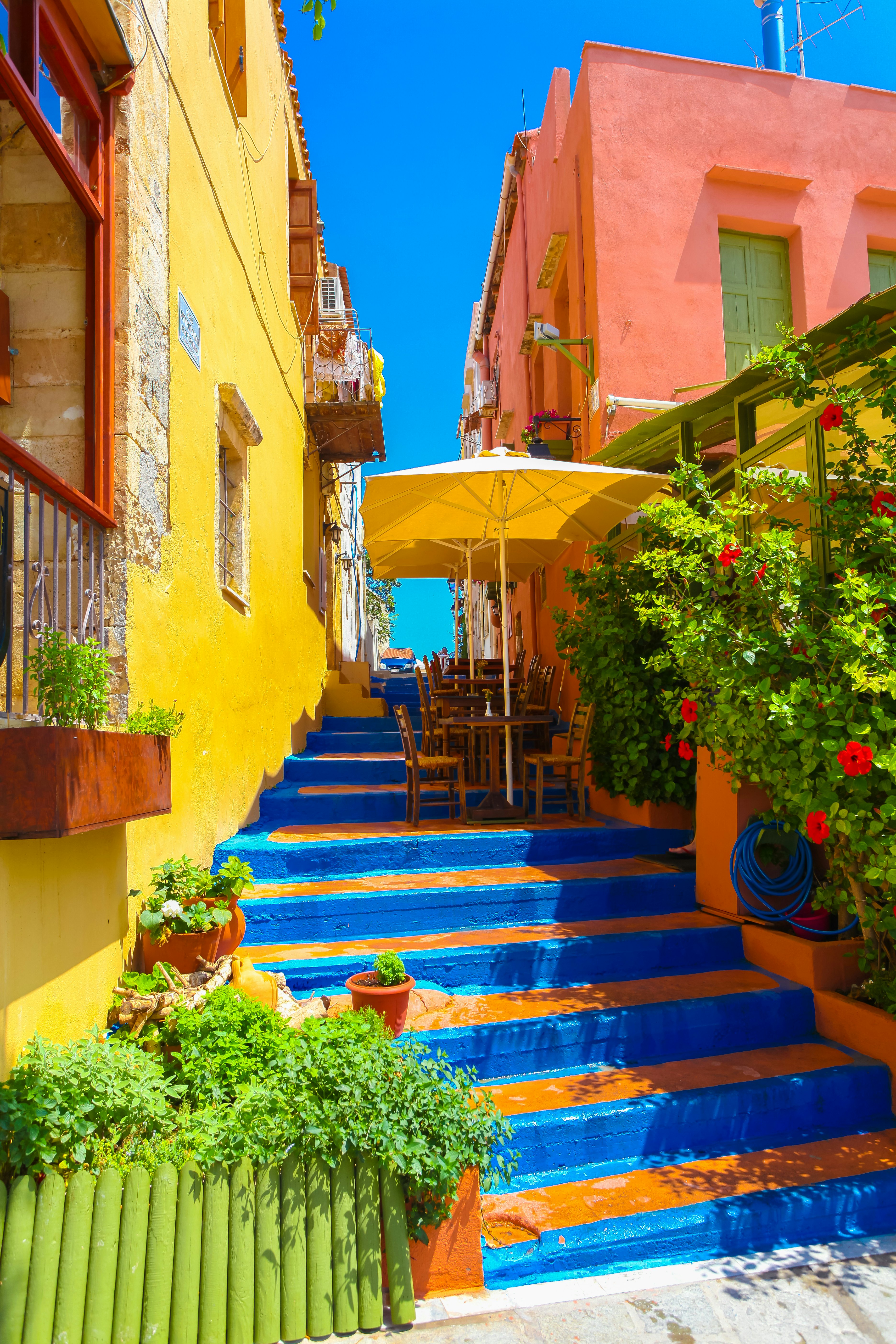
9. Cycle among windmills at Lasithi Plateau
Where 20,000 stone, steel and canvas windmills once turned, some 5000 still do today. The vast Lasithi Plateau is Crete's bastion of tradition. Green fields wend around orchards of pear, almond, apple, olive, cherry and other trees. The bounty is tended to by farmers, who still live in sturdy stone houses and drive tractors on the narrow farm roads.
Planning tip: It's a fertile panoply just made for touring by bicycle. Base yourself in the village of Agios Georgios and cycle out into the hinterlands.
10. Go windsurfing at Kouremenos Beach
Not far from the farm town of Palekastro on Crete's east coast, the beach at Kouremenos at first seems rather unremarkable: it's pebbly, and the setting is a tad mundane, but then you notice the wind, and then you notice the windsurfers, and you say "Ah-ha!" Thrill-seekers flock here to hit the waves with the wind at their backs thanks to reliable, nearly year-round gusts.
Detour: Escape from the beach for a wander through the evocative ancient houses and roads of the ruins of the Lassithi Palekstro Minoan town, found just two kilometers from the modern village of Palekastro.
11. Try spotting Africa from Myrthios
From Myrthios on a clear day, you can see... OK, it's not Africa, which is 300km (186 miles) southwest across the Libyan Sea, but you can take in the vast vista from one end of the shining sea to the other. This Instagram-worthy village is perched high on a cliff face above the busy beach town of Plakias. It's a wonderful spot on the south coast to get a room with a view and gaze out over the water.
Detour: Discover rural pathways on a donkey trail from nearby Plakias Horse Riding Centre to the old town of Myrthios, stopping off to take in the views on the way.
12. Walk through Zakros Gorge, the Valley of the Dead
A meandering green river, rock-studded walls and the usual profusion of wildflowers mark Zakros Gorge, a much quieter place than its famous counterpart at Samaria. The Valley of the Dead (the gorge's other name) is dotted with ancient Minoan burial sites in caves in the canyon walls. Route options for navigating the valley range in length from 2.5km to 4km (1.5 to 2.5 miles).
Planning tip: This is the endpoint of the 10,000km/6215-mile-long E4 European hiking path, so if you're feeling really energetic, start your trek at the beginning of the route in Portugal.
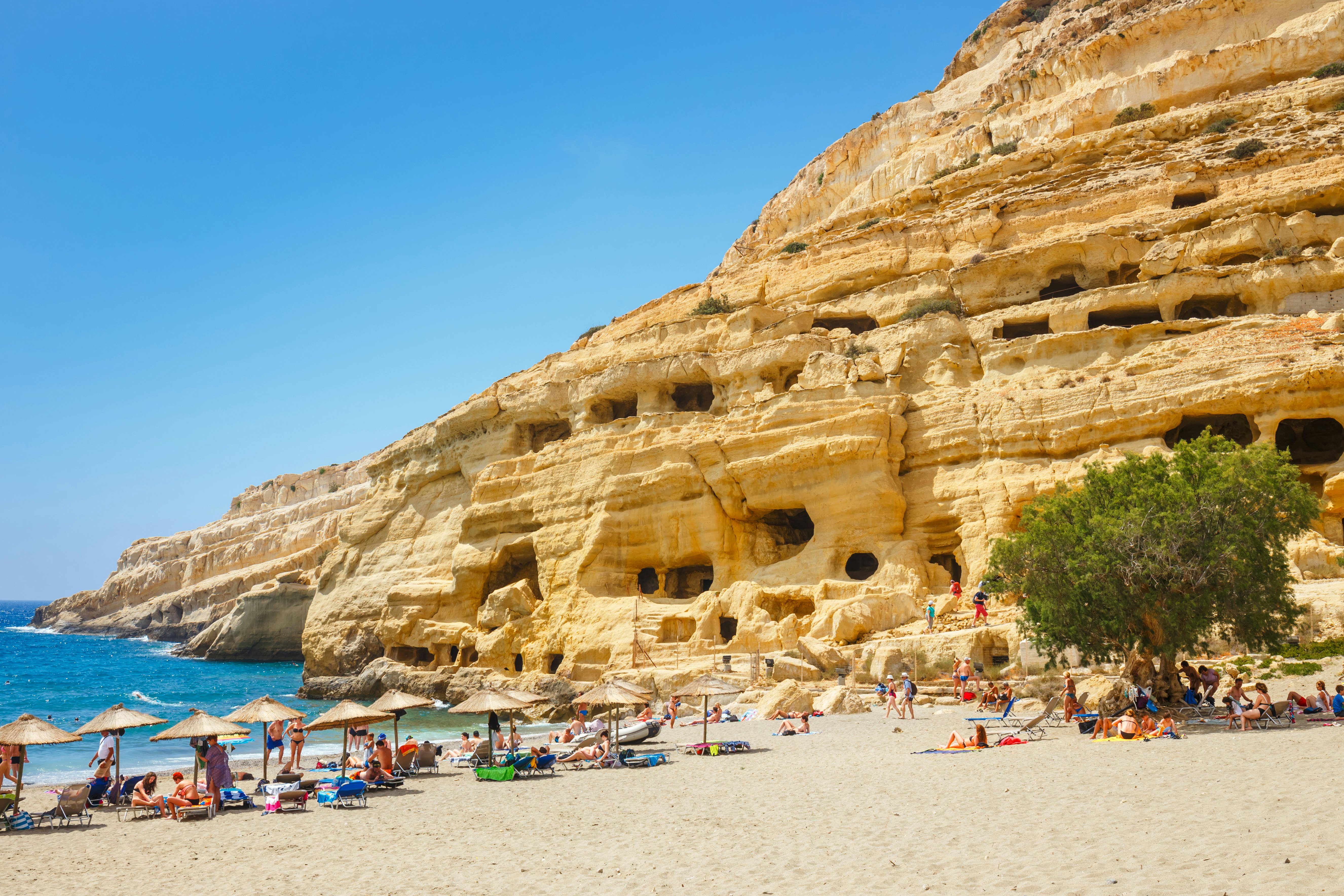
13. See the Roman ruins at Gortyna
Minoans, Greeks, Byzantines, Ottomans, even Nazis: past empires and conquering forces are inescapable in Crete. But what about the big dogs of the Mediterranean, the Romans? Well at Gortyna in south-central Crete, the Roman world is on full display in what was once the island's Roman capital. From 67 BCE, this sprawling archaeological site was a hub of Roman commerce and conquest. Ruins of theaters, temples and baths are among the highlights here.
Detour: Follow the 1960s hippie trail to the white sands of Matala, nearby. A coastal village with ancient cliffside caves that date back to the Neolithic period, it was occupied in the sixties and seventies by a community which they say included Cat Stevens, Bob Dylan and Joni Mitchell.
14. Absorb the beauty of the wall paintings at the Church of Panagia Kera
Amidst the triple aisles of this tiny church, you'll find extraordinary 14th-century Byzantine frescoes. Pause in the dome and the nave and study four scenes: the Presentation, the Baptism, the Raising of Lazarus and the Entry into Jerusalem. Other iconic moments from the New Testament include a sobering Punishment of the Damned.
15. Watch the sunset at Falasarna Beach
The setting sun is on full display as it sinks below the Mediterranean horizon at Falasarna Beach, a west-facing strand of sand that is just low-key enough for you to quietly enjoy the daily spectacle of gold, orange and red. During the rest of the day, visitors enjoy the pinkish-white sand and azure waters. A couple of cafes offer refreshments, and trails lead off to minor archaeological sites.








